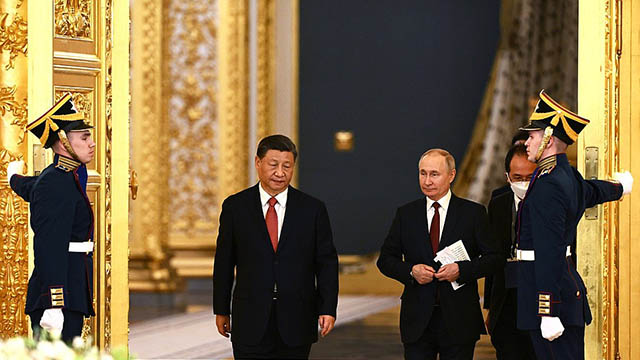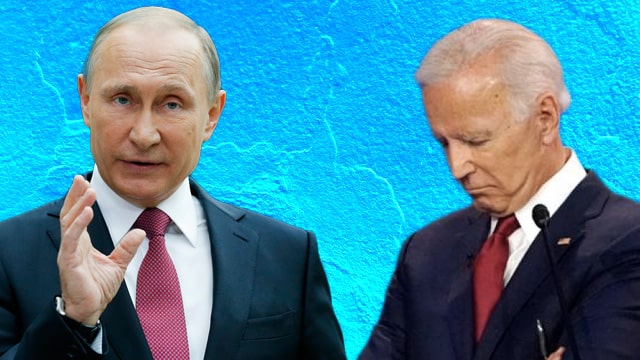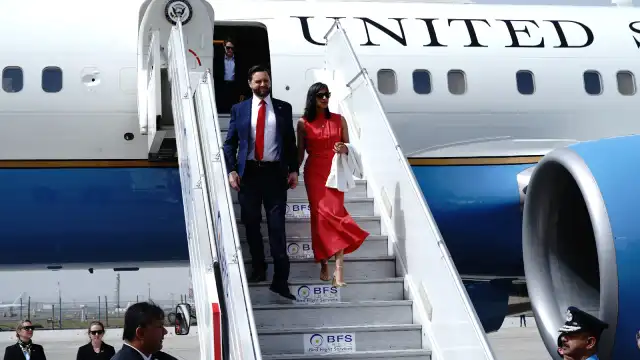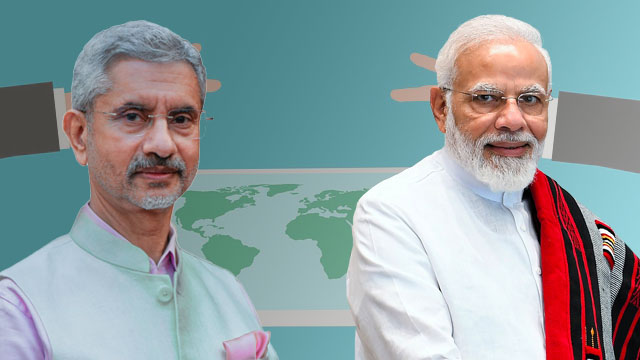Xi Jinping’s recent visit to Russia and his meeting with Russian President Vladimir Putin has paved the way for the strengthening of Sino-Russian ties. Xi’s Russia visit amid the latter’s special military operations in Ukraine has raised several eyebrows in the West, as a stronger China-Russia alliance advocates for a multilateral, multipolar, anti-hegemonic and peaceful world order.
Moreover, the closer ties between these two military superpowers not only pose a threat to western hegemony but also surpasses the collective military strength of the US-led western bloc.
Xi’s Russia visit isn’t merely coinciding with Russia’s growing hostility with the West, especially due to the visceral hatred exhibited by US President Joe Biden’s administration towards Kremlin, but also when China is facing a stiff challenge from a military entente formed by the US in its backwaters.
Geopolitical experts in Beijing have been alleging over decades that Washington DC has a plan to militarily encircle China, and developments in the last five years exhibit that the warning has become more real than ever.
After intense tension over the Taiwan Strait in August 2022, which was triggered by House of Representative Speaker Nancy Pelosi’s provocative visit to the breakaway island, China and the US also confronted each other over unmanned aerial vehicles (UAVs) that were found flying over North America earlier this year. The US shot down a Chinese UAV, calling it a surveillance balloon, while China claimed it was a weather research vehicle and condemned the US’s hysteric reaction.
Moreover, the US has been trying to block China’s access to semiconductors by militarizing the Taiwan Strait and imposing trade sanctions on China. Although the European Union (EU) remains one of the largest trading partners of China, the US pressure on the bloc is aimed at hurting Chinese business interests.
However, as China’s industrial production is higher than that of the entire Europe, which has been deindustrialised over years, and as it tends to surpass the US economy by 2030, there is little the US pressure and sanctions can do to thwart the Chinese economy’s growth.
At a time when the US sanctions on Russia impacted the EU’s economy, jeopardising its energy needs, Russia’s unemployment fell to an all-time low after the collapse of the Soviet Union. The US’s attempts to financially isolate Russia failed immensely, and its financial sector, and that of the West, entered a severe crisis zone.
The US-based Silicon Valley Bank collapsed; 186 other US banks await the same ordeal per a recent study, and the 167-year-old Swiss banking giant Credit Suisse has faced an unprecedented crisis, prompting the Switzerland government to force its competitor UBS AG to acquire the ailing bank.
As the West is heading towards a total financial crisis, with no solution visible on the radar, Russia and China are working on a world order that will bypass the dollar-based economy that has favoured the US so far. With China’s Belt-Road Initiative (BRI) gaining momentum, and China playing a major role in resolving crises and conflicts in Middle East, following the historic deal between bitter regional rivals Saudi Arabia and Iran, and the initiation of a peaceful solution between Israel and Palestine, the US’s influence on the Global South appears waning.
In this scenario, China is approaching the Central Asian former Soviet republics for a dialogue to forge a stronger alliance with them. The Shanghai Cooperation Organisation (SCO) has become a formidable force in the world with a large number of participants that challenge the US hegemony in the Global South and even traditional US allies like Turkey are showing their interest in moving towards the new alliance, leaving the western camp.
Recently, the International Criminal Court (ICC) issued an arrest warrant against Putin, accusing him of war crimes in Ukraine. Although the US itself, like Russia, doesn’t recognise the jurisdiction of the ICC, it upheld the warrant against Putin. However, the US didn’t mention how it violated all global norms to launch attacks on Iraq using false information 20 years ago. The US aggression on Iraq has been categorised as a war crime, but none of its perpetrators was prosecuted and the US didn’t face any global sanctions for the war crime.
In this scenario, Xi’s Russia visit underscored that the Chinese are keen to take along Putin as their partner in economic and military spheres, which will eventually harm the US-led West’s hegemonic interests. As the Global South is also keen to be a part of a multilateral and multipolar, peaceful world order, the West’s hegemony under the US’s leadership is going to suffer further in the days to come.
The editorial board of East Post is responsible for the columns published in the Editorial section. This column expresses the organisation's views.




